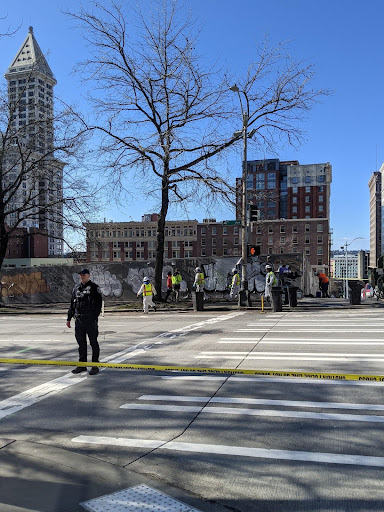A row of tents lining two blocks of 4th Avenue in downtown Seattle was cleared by police and municipal workers morning Wednesday, March 9, despite opposition from anti-sweep activists.
Around 8 a.m., the Seattle Police Department (SPD) cordoned off the avenue between Columbia Street and James Street, where some unhoused individuals had been living for months. After SPD established and secured a perimeter around the block, municipal workers were sent in to sweep the area.
A dump truck was used to collect debris, as well as personal belongings left behind by the unhoused, including tents. By 10 a.m., the encampment had been entirely removed. Due to the heavy police presence and threats over an LRAD of detainment and arrest, there was little to no resistance from the unhoused individuals and activists present.
However, this encampment had been scheduled for clearing several weeks prior. The city provided notice that a sweep of the area would occur on Feb. 20. This was met with an outcry from homeless advocates, who pointed out that there was a cold weather warning in effect at the time — in fact, record low daily temperatures were set during that week.
The reported response from Mayor Bruce Harrell’s office was, “We cannot allow tents and other structures to remain in right of way … if they are causing an obstruction. … Under the City’s existing procedural rules, there is no requirement for offers of shelter when an encampment is creating an obstruction.”
Activists called the city’s intended sweep during frigid weather inhumane, putting individuals in an already tenuous shelter situation in even more danger. Advocacy groups including Stop the Sweeps Seattle and Seattle Protest Network rallied like-minded volunteers to risk arrest and prevent the Feb. 20 sweep. This effort succeeded, and activists maintained their presence at the encampment afterward in case of future action by the city.
The Harrell administration, clearly seeking to avoid another failed attempt, used different tactics for the March 9 sweep. Most notably, the only prior notice was given at 6 a.m., barely two hours before the sweep was underway. While this prevented activists from forming en masse, it also resulted in more loss of belongings from unhoused individuals who, due to the precedent of a 48 hour notice, may have expected more time to pack.

Considering that the city ended up sweeping the encampment regardless, was the show of support and resistance by volunteers merely a stalling tactic, or was it completely inconsequential? Representatives from Stop the Sweeps believe their actions were not in vain.
An advocate assisting the unhoused at 4th and Columbia explained, “If we had allowed the sweep to happen, all the people living here wouldn’t have had access to the most used warming shelter, which is City Hall … a lot of folks came to us because the city wasn’t actually disseminating the information on the ground to people about where to go.” They added that the planned Feb. 20 sweep was on a Sunday, when many service providers and outreach workers, including the city’s HOPE Team, aren’t working.
Another activist offered his perspective on why sweeps are counterproductive to the city’s combating of homelessness: “Sweeps disorganize any attempts to get people into places that will work for them, … we’ve been trying to push the city to scrape together their meager resources and offer something that’ll be successful for someone to get inside and stay inside.”
While this 4th Avenue encampment was the most contested site, it was far from the Harrell administration’s only target. Several other sweeps downtown and in other areas of Seattle have been executed in recent weeks. It remains to be seen if the new mayor’s hardline strategy will reduce rates of homelessness, or simply make an endemic issue less visible.
Author

Kayvon Bumpus was The Seattle Collegian's Managing Editor. An immersed writer, lifelong musician, and Seattleite, he hopes to use journalism to elucidate and convey varieties of knowledge - a worthwhile endeavor in our current age of distraction and disinformation.







What happened to the people that were removed? Where did they go? Could you do a follow up story about this topic? It is disheartening to know that they took some of their personal items including their tents. What a loss for individuals that have so little. The article was informative but I am very interested to know about what will happen with everyone that lost their make-shift homes.
It’s people like Karen Lauper above that has gotten Seattle to the point it is today. The moment they set up their tents on public sidewalks, they should be asked to leave. You don’t get to keep your belongings after weeks of notice to pack up your stuff for obstructing the right of way of pedestrians. People like Ms. Lauper have more compassion for out of state drug addicted vagrants than the residents of this city trying to walk down the street to go to work or get their groceries. The role of government is not to funnel all resources and compassion to drug addicts at the cost of everybody else in society. It’s ridiculous. We have laws, we need to enforce them. Selective enforcement is the path to third world countries and slums.
You’re arguing that the suffering of housed people walking down a street and seeing homeless people is greater than the people who are sleeping on the street, and that the former group deserves more compassion?
Enforcing laws doesn’t fix the problem unless there’s a viable solution. The city hasn’t created one yet.